

Ways to Combat Sleep Difficulty. Either you are struggling from nightmares or cramming for a late-night submission, getting an appropriate sleep is one that is difficult to keep on track.
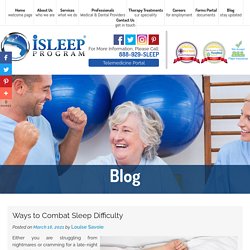
With the help of Sleep Apnea experts, such as Sleep Clinic in Bronx, New York, you can be assisted with how to slumber your sleep. Home Assisted Test One of the best ways to keep track of sleep has to be administered at home. This test administered by professionals from the is based on your assessment of the sleep records. It is perfect for home use and even cost-effective. Airway Pressure Pump For cases having moderate to severe sleep apnea, the suggested treatment would be through CPAP. The Difference Between Chronic and Acute Insomnia. The word ‘insomnia’ has been used to describe several nights of bad sleep instead of a medical diagnosis like it was intended to be.
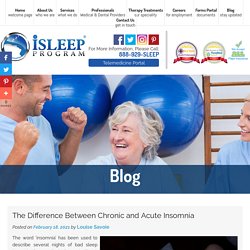
This, along with how the symptoms of the disorder are strikingly similar to bouts of sleeplessness because of stress and some other significant life events, can make it difficult to know if what we are experiencing is insomnia. Not to mention, the disorder can manifest in two ways—chronic insomnia or acute insomnia. Thus, as your trusted sleep disorder center in Brooklyn, New York, we at , say that the surest way to determine this is to differentiate your symptoms from chronic or acute insomnia.
Avoid sleeping on your potential insomnia, identify which type your symptoms belong to. Acute insomnia happens when you are experiencing high stress levels in the body. Self-Help Tips to Ease Migraine Pains. What Is Central Sleep Apnea? Sleep disorders are plenty and unique – no sleeping disorder is the same as the other.
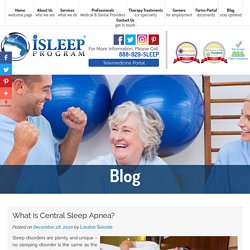
We at , a leading Sleep disorder center in Brooklyn, New York, would like to share with you, our readers, information about one specific type of sleep disorder – central sleep apnea. What do we mean when we say central sleep apnea? It is a disorder where the patient’s breathing stops and starts during sleep. As a result, the patient will lack ventilation, and it may affect the balance of gasses in the body. What to Know About Obstructive Sleep Apnea. When you have obstructive sleep apnea, your throat muscles tend to relax when you sleep.
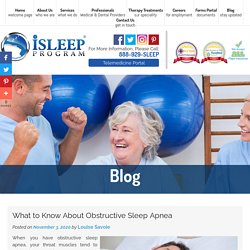
As a result, it narrows or blocks your airways, preventing you from breathing normally. This can impact your body’s health because the air that you breathe carries the oxygen in your blood. According to a specialist in a sleep disorder center in Brooklyn, New York, low blood oxygen levels can result in fatigue, slow or fast heart rate, and shortness of breath—even though a person has slept for eight hours. Another problem is that your body is prompted to wake you up from your slumber multiple times because of the narrowing or blocking of your airways. When you wake up, you usually reopen them by choking or gasping. Sleeplessness and Alcoholism. Are you one of the many people who have made it a habit to have a nightcap or two before sleep?
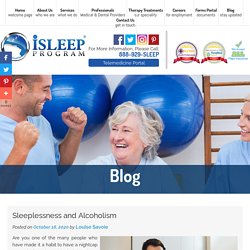
Alcohol does have a lulling effect that sends people off to sleep, but it is not always that beneficial, experts say. This is because alcohol disrupts the process that results in a deep and satisfying sleep. It is done by interrupting the body’s rapid eye movement phase of sleep, which aims to rejuvenate the brain and get it ready for a whole new day at work. What Causes Insomnia? The sleeping problem called insomnia is quite prevalent in American society.
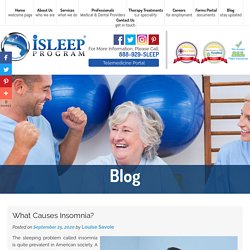
A poll made by the National Sleep Foundation in 2005 showed that respondents in the survey have experienced symptoms of insomnia or sleeplessness more than once a week within the span of a year. Moreover, the National Institute of Health says that 10% of the population are experiencing impairment of daytime functioning as a result of clinical insomnia. In addition, 30% of Americans experience sleep disruption every now and then, with results of impairment in their daily functioning especially at work.
If you suspect that you have insomnia, you should make it a point to visit a sleep clinic in Bronx, New York to have your symptoms looked at and start your treatment. Now, what causes insomnia? Insomnia is the direct result of both physical and social stimuli. Stress If something is bothering someone, he or she will have difficulty sleeping. Simple Ways to Fall Asleep Quickly. As having poor sleep can affect various parts of your body and brain, specifically in the areas as mood, emotions, memory, learning, and various biological functions, a sleep clinic in Bronx, New York lists down the following ways you can fall asleep quicker: Lower the room temperature.
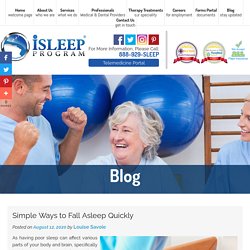
As you sleep, your body temperature alters, so your core temperature decreases while that of your hands and feet increases. While you have your preferences, setting your thermostat between a cool temperature of 60–75°F (15–23°C) will greatly help. Set a schedule. Why Sleepwalking Happens. Have you experienced getting up from bed or walking while you are asleep?
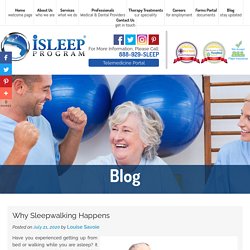
It may sound unusual, but sleepwalking does happen to some people, whether young or adult. Sleepwalking, also called somnambulism, occurs when a person gets up from the bed and walks around even though he or she is still asleep. Snoring: What Causes It and Should You Worry? Snoring is described as noisy breathing during sleep that may occur nightly or intermittently.
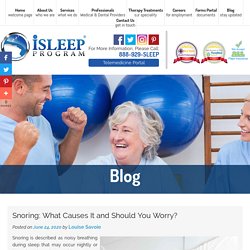
It is a problem present among all genders and ages. As a matter of fact, it affects approximately 90 million American adults regularly. There are various causes of snoring. Driving and Sleep Apnea: 4 Common Questions, Answered! , a trusted source of sleep apnea therapy in Bronx, New York, answers some of your most pressing questions related to driving and sleep apnea.
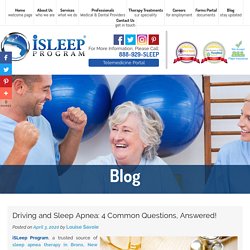
What is sleep apnea? Sleep apnea is a serious sleep disorder that causes brief breathing disruptions during sleep. These pauses in breathing can last for at least ten seconds or more. The Link Between Sleep and Depression. Depression can make it incredibly difficult for you to get some shut-eye. The reason for this is the link between sleep and depression. Sleep or even staying asleep can be elusive to those who are suffering from depression. Don’t think twice about visiting , for quality Sleep Apnea Therapy in Bronx, New York. We deliver a wide range of solutions to individuals who are regularly finding it a challenge to get healthy sleep. Did You Know That Bad Sleeping Habits Cause Brain Fog? If you don’t catch enough zzzs at night, be careful.
Your mental health is at risk. Brain fog is also synonymous with mental fatigue. Technically speaking, it isn’t a condition in itself. Hypersomnia: Signs, Causes, and Prevention Tips. Everyone has days when they feel sleepy. However, hypersomnia – which refers to excessive sleeping or excessive daytime sleepiness – is different from feeling tired all of the time. Is It Normal to Feel Sleepy During the Day? Well, that depends. If you’ve pulled an all-nighter before, then yes. Why Your Children Need Enough Sleep.
Most parents generally want to get their children to bed early. One reason is so they can have some quiet time for themselves. The most important reason, though, is that they want their child to grow up healthy and strong. After all, going to bed early and getting enough sleep at night will only bring benefits. Sleep Hygiene: The Do’s and Don’ts. Falling asleep may feel like an impossible task when you are wide awake at 3 AM, but good sleep is more under your control than you might assume. Following healthy sleep habits can make the difference between a restful or restless slumber. How Lack of Sleep Affects Your Metabolism. Sleep is the body’s way to take rest. Through sleep, the body can heal and recharge.
Yet, there are times when people do not get enough sleep. Why You Need to Know About Restless Legs Syndrome. The restless legs syndrome (RLS) is one of the impediments of getting good sleep. It is characterized by unpleasant sensations at the legs causing the person to move them. Enrollment Begins in Real-world Study Comparing Oral Appliances and CPAP. Enrollment has begun in the SARAH Study, an investigation of real-world disease alleviation for patients with obstructive sleep apnea (OSA). The study is based upon the “SARAH” Index, a sleep adjusted residual apnea-hypopnea index that provides a formula to measure treatment effectiveness taking into account not only efficacy under ideal circumstances but also compliance in real-world circumstances. This SARAH Study is designed to test these differences for CPAP and oral appliances. “The Effective AHI (SARAH index) tells the real story of how well an OSA therapy is working in the real world with patients.
McEvoy demonstrated the impact of adherence on outcomes; we need this research to help us match the best therapy, considering adherence, for our patients,” says board certified sleep physician and cardiologist Lee A. Sleep Apnea: Should You Worry If You Have It? 7 Lifestyle Changes That Can Help Improve Narcolepsy. How much do you know about narcolepsy? What to Do If You Struggle with Insomnia. Insomnia is a sleep disorder that can make it difficult for sufferers to get the rest they need. This can have an adverse effect on their quality of life and even their health. PAP Improved Survival in Obese Patients with Severe OSA. Treatment with positive airway pressure (PAP) was associated with a lower risk of death from all causes in obese patients with severe obstructive sleep apnea (OSA) participating in the Sleep Heart Health Study.
The risk of death from all causes associated with a PAP prescription was 62% lower among obese patients with severe OSA over 11 years of follow-up. The risk reduction was independent of key confounders, including cardiovascular disease and diabetes, and the association was identified 6 to 7 years after PAP was first prescribed. This finding suggests that randomized trials failing to show a mortality benefit for PAP treatment in the setting of severe OSA may have not followed patients long enough, reported Quentin Lisan, MD, of the Paris Cardiovascular Research Center, and colleagues.
“A second related explanation is the small number of fatal events observed in randomized controlled trials, usually fewer than three,” the team wrote online in JAMA Otolaryngology-Head; Neck Surgery.